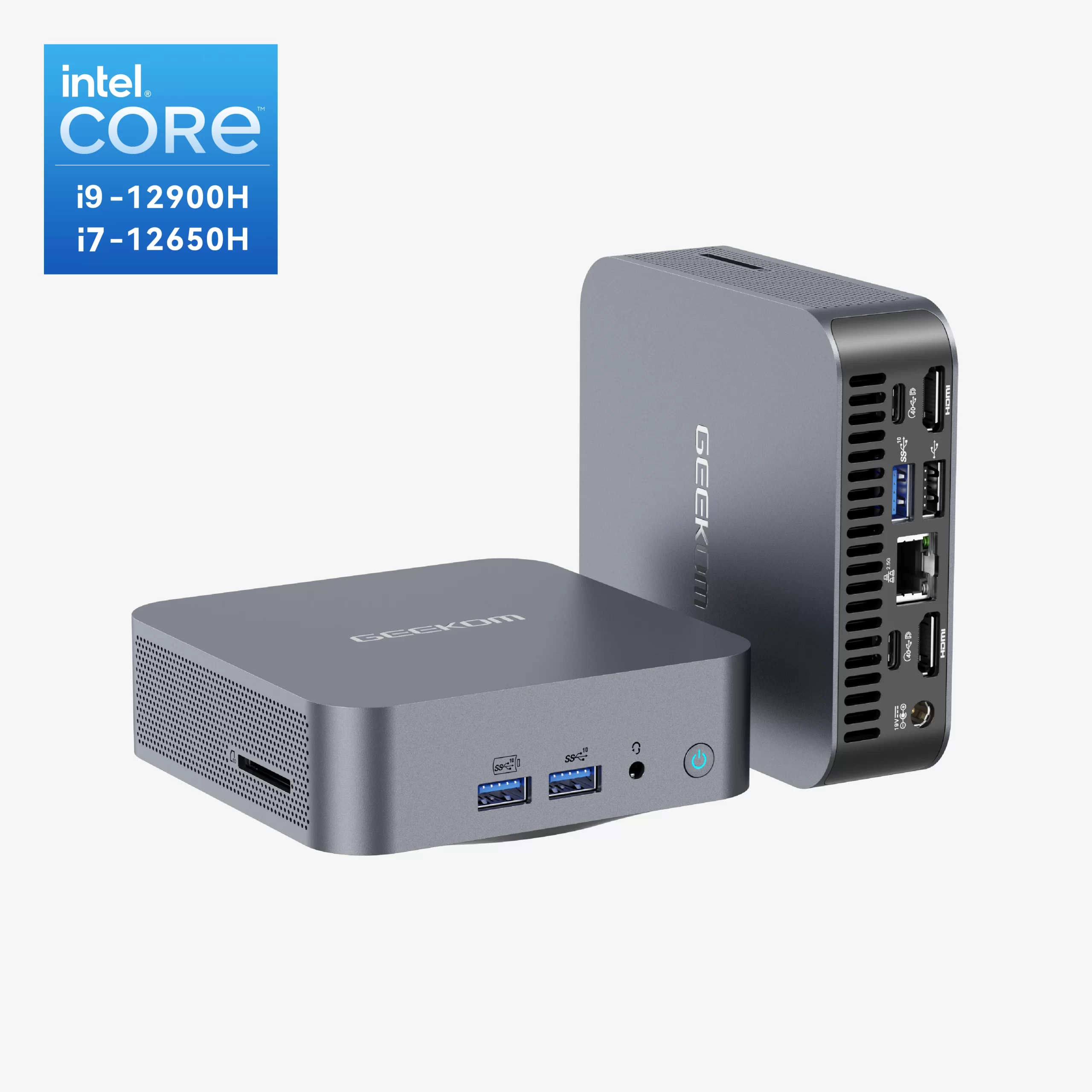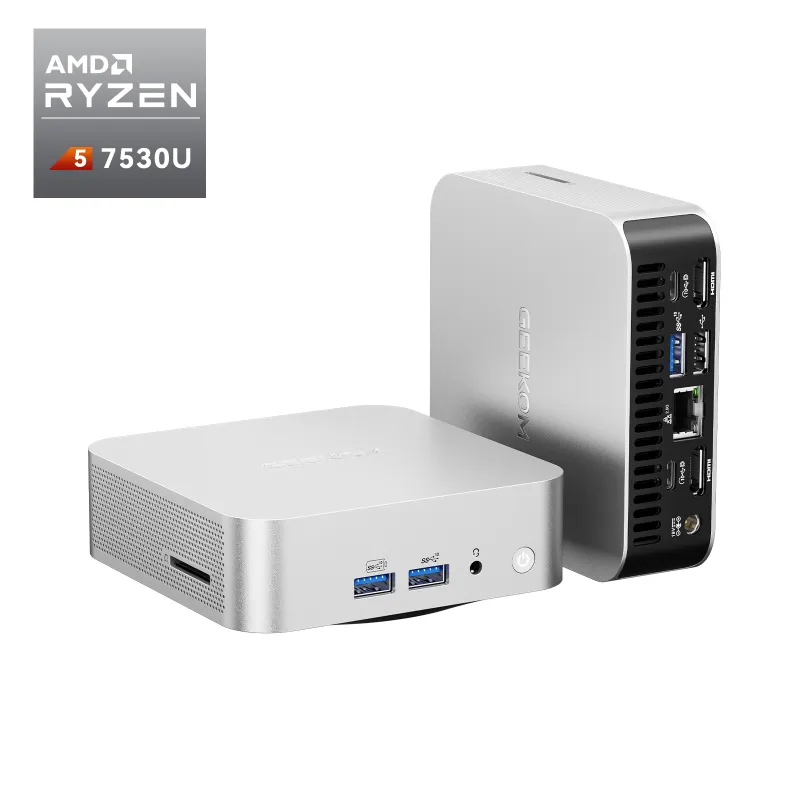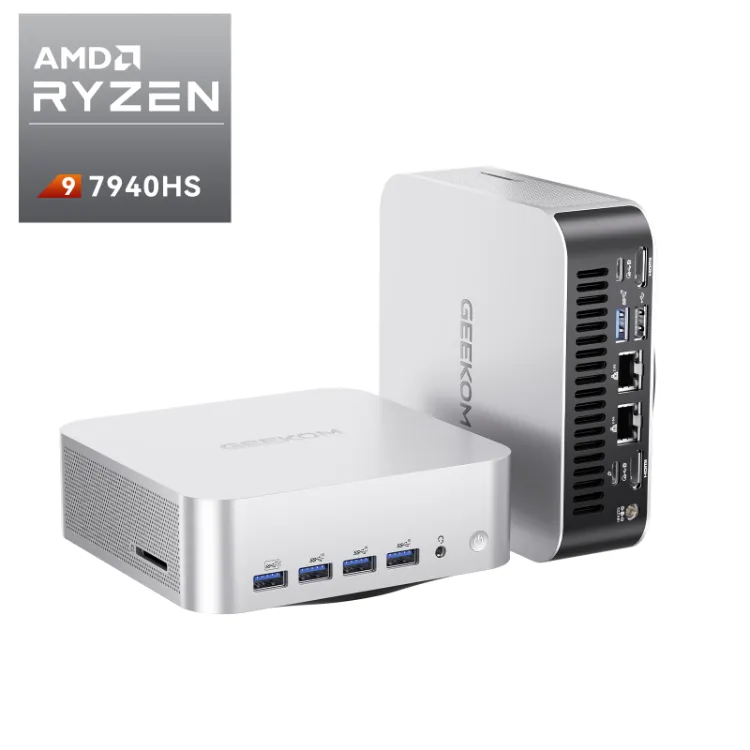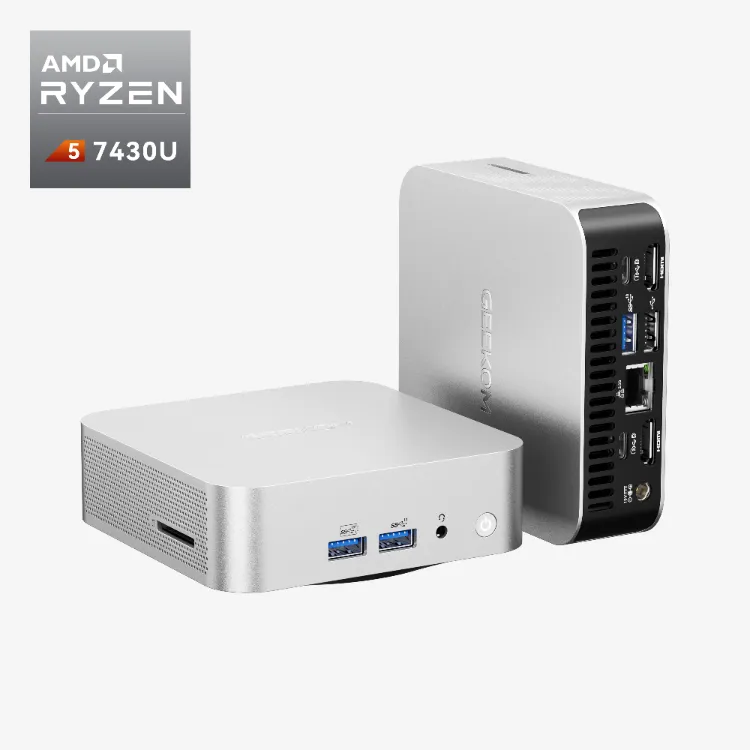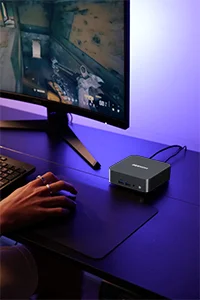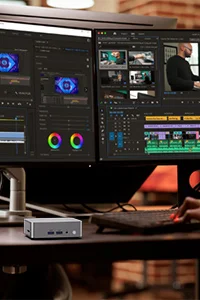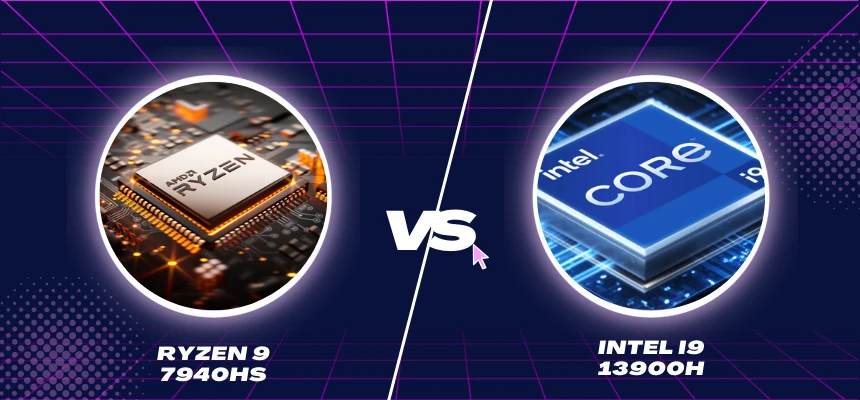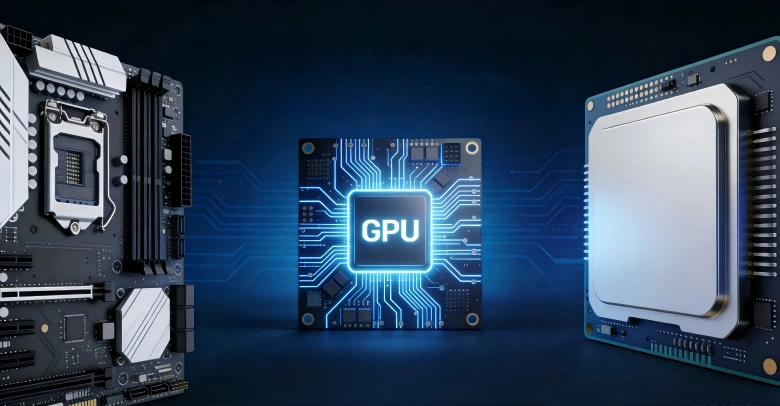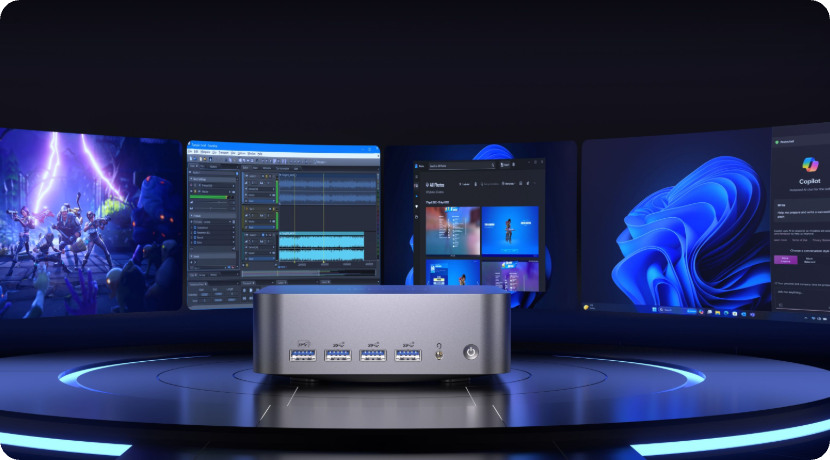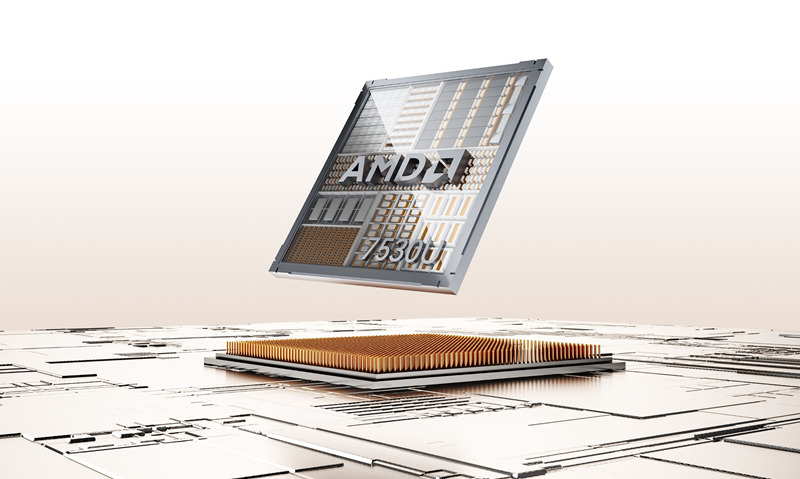Introduction
The competition for high-performance computing multicore processors with various capabilities of gaming, digital content creation, and professional multitasking focuses on the selection of a CPU that will bring the best out of it. Let’s compare two competing CPUs: the AMD Ryzen 9 7940HS and the Intel Core i9-13900H.
Ever since they entered the market for computing technologies, AMD and Intel have exceeded the conventions and standard specifications of CPU technologies. The AMD Ryzen 9 7940HS from Zen 4 and Intel Core i9-13900H from the Raptor Lake series are the top representatives of their respective lineups. Both processors have their respective strengths and offer various advantages, depending on a user’s needs and preferences.
With so many differences in mind, this article will evaluate the two CPUs to describe their architecture, core and thread counts, clock speeds, power draw, integrated graphics, memory support, price, and performance in general. Thereafter, there should be an understanding of what CPU to seek for your needs.
7940HS Vs i9-13900H: Architecture and Technology
Both AMD’s Ryzen 9 7940HS and Intel’s Core i9-13900H are the latest State-of-the-Art CPU technologies from both companies.
AMD Ryzen 9 7940HS is built on the Zen 4 architecture and uses a 5nm manufacturing process, which allows for higher transistor density, improved efficiency, and better performance. Key breakthroughs include:
- Enhanced power efficiency: The 5nm process cuts power consumption by maintaining high performance.
- Advanced multi-core performance: With core design improvements applied, the Ryzen 9 7940HS does a wonderful job on tasks requiring large amounts of parallel processing.
Intel Core i9-13900H is part of the Raptor Lake series, utilizing a 10nm Enhanced SuperFin process. Notable advancements include:
- Hybrid architecture: Distributive workload across many high-performance cores with efficiency cores.
- Increased IPC (Instructions Per Cycle): Improvements with the core design provide enhanced single-threaded performance.
They both are equipped with respective sizeable advancements in technology to provide by far the best performance, efficiency, and scalability.
AMD Ryzen 9 7940HS vs Intel Core i9-13900H: Key Differences
| Specification | AMD Ryzen 9 7940HS | Intel Core i9-13900H | Intel Core i9-13900HK |
|---|---|---|---|
| Architecture | Zen 4 | Raptor Lake | Raptor Lake |
| Manufacturing Process | 5nm | 10nm Enhanced SuperFin | Intel 7 (10nm Enhanced SuperFin) |
| Cores/Threads | 8 cores / 16 threads | 14 cores / 20 threads | 14 cores / 20 threads |
| Base Clock Speed | 4.0 GHz | 3.5 GHz | 3.5 GHz |
| Boost Clock Speed | 5.2 GHz | 5.4 GHz | 5.4 GHz |
| TDP | 45W | 45W | 45W (configurable) |
| Integrated Graphics | AMD Radeon™ Graphics | Intel Iris Xe | Intel Iris Xe |
| Memory Support | Up to 64GB DDR5 | Up to 64GB DDR5 | Up to 64GB DDR5 / LPDDR5x |
| Connectivity | Wi-Fi 6E, Bluetooth 5.2 | Wi-Fi 6E, Bluetooth 5.2 | Wi-Fi 6E, Bluetooth 5.2 |
Core And Thread Count
AMD Ryzen 9 7940HS: Rather fewer in cores, but with highly effective and optimized multithreading, capable of dealing with tasks widely using single-core performance and moderate multicore performance. This CPU lends itself easily to gaming and light content creation. Because of this optimized core design, single-threaded-oriented applications run so smoothly and quickly.
Intel Core I9-13900H: It is equipped with more cores and threads, meaning this chip is tailored for demanding applications, like video editing, 3D rendering, heavy multitasking, and powerful data processing. The cores thus endow more thrust for parallel processing, providing for more tasks done concurrently, and they finish them on time, reducing the waiting time for the multi-threaded workloads.
Clock Speeds And Performance
AMD Ryzen 9 7940HS: With its higher base clock speed, strong performance at everyday tasks and gaming is assured. It responds very quickly and smoothly and works among applications that would need sustained high clock speeds. Similarly, the efficient boost clock also grants good performance in bursty workloads, which means that this CPU can perform well even under difficult tasks when it’s needed.
The Intel Core i9-13900H: With a slightly improved boost clock, it’s capable of higher performance than normal with certain intensive applications whenever the highest single-core performance is critical. Such specializations are usually reserved for high-end gaming and complex simulations or any software requiring high clock speeds for good performance.
Power Consumption And Thermal Management
AMD Ryzen 9 7940HS: The use of 5nm manufacturing renders this processor highly efficient in terms of power, resulting in less heat building up in the notebook and offering extended battery life. Power efficiency means that the AMD Ryzen 9 7940HS can be recognized as ideal for portable computing devices to which thermal management poses significant challenges. Such efficient power usage also leads to energy being spent less as heat, which results in the system temperatures remaining cool, hence further reducing the possibility of heavier cooling solutions.
Intel Core i9-13900H: Even with the same TDP, power optimization through hybrid architecture utilizing both performance and efficiency cores. Efficiency cores run lighter loads, allowing power savings, while performance cores kick in with more demanding workloads. Dynamic power management allows a balance of performance and power consumption, allowing the Core i9-13900H to cater to both high-performance and energy-efficient applications.
Memory Support and Compatibility
AMD Ryzen 9 7940HS: It has plenty of memory bandwidth and compatibility with the newest DDR5 modules. This leads to a performance progression for memory-hungry applications such as video editing, 3D rendering, and sizeable databases. Hence, it is a speedy method for modern-day applications to meet their demanding requirements of fast data access and reliable multitasking for those users who constantly require fast memory performance.
Intel Core i9-13900H: This also comes with DDR5 memory support, which provides for fast data access and builds with the future in mind. Another advantage it has over its peers is DDR5 compatibility and the feisty memory controller built into it enables the effective handling of big datasets and complex applications, hence making the Core i9-13900H the platform of choice for professionals wanting to run several sexy applications at once.
For a more detailed comparison of the differences between the Intel i9 and Ryzen 9, you may also be interested in this piece of content: Intel i9 Vs AMD Ryzen 9: Which Is Right For You 2024?
Ryzen 9 7940HS vs Core i9 13900H: Benchmark Scores
| Benchmark | AMD Ryzen 9 7940HS | Intel Core i9-13900H |
| Cinebench R23 (Single-Core) | 1,780 | 2,016 |
| Cinebench R23 (Multi-Core) | 16,867 | 18,760 |
| Geekbench 5 (Single-Core) | 1,974 | 1,919 |
| Geekbench 5 (Multi-Core) | 11,600 | 14,632 |
| PassMark (CPU Mark) | 30,995 | 31,788 |
Recommendations
If your main uses lean towards applications that benefit most from high single-core performance, such as certain games or software that isn’t multi-threading-optimized, the Intel Core i9-13900H offers superior Cinebench R23 single-core scores and thus is the best pick.
Similarly, though it’s also great for productivity when it comes to workloads that can fully utilize heaps of threads, such as video editing, 3D rendering, or large-scale data processing, naturally the Intel Core i9-13900H is clearly ahead thanks to its better multi-core scores in both Cinebench R23 and Geekbench 5. Naturally, this makes it one of the most appropriate picks for professional and creative workloads.
Now, if you’re after a CPU that delivers an optimal balance of single-core and multi-core performance, that’s the AMD Ryzen 9 7940HS. In addition, it boasts some outstanding benchmark performance across the board, which allows it to dish out strong performance for single-threaded as well as multi-threaded applications. As shown in the PassMark CPU scores, the Intel Core i9-13900H barely has the upper hand, which is tight enough to mark it as an all-around choice good enough for all kinds of users in particular.
In the end, absolutely go for the Intel Core i9-13900H if you wish to secure the best possible single-core and multi-core performance. Opt for the AMD Ryzen 9 7940HS if you prefer a well-rounded CPU that you can use with peace of mind it will score close to the top across a variety of benchmarks.
Ryzen 9 7940HS vs Core i9 13900H: Which Is Better For Gaming?
The platforms boasting integrated graphics that aid gaming performance include, among others, the AMD Ryzen 9 7940HS and the Intel Core i9-13900H, offering enticing propositions for laptop and mini-PC gaming. Here are the average frames per second (FPS) for both CPUs in several popular games, tested at 1080p resolution with medium to low settings to ensure playable frame rates:
| Game | AMD Ryzen 9 7940HS (Radeon™ Graphics) | Intel Core i9-13900H (Iris Xe) |
| Fortnite | 45 FPS | 40 FPS |
| Valorant | 80 FPS | 75 FPS |
| League of Legends | 100 FPS | 95 FPS |
| CS:GO2 | 70 FPS | 65 FPS |
| Minecraft | 60 FPS | 55 FPS |
| The Witcher 3 | 30 FPS | 28 FPS |
Under integrated graphics support, while AMD Ryzen 9 7940HS is slightly ahead compared to Intel Core i9-13900H on most of the popular titles, making it the better choice for gaming on laptops and mini-PCs without a dedicated GPU, this applies even in the case of less graphically demanding titles or those that can run well at lowered settings. While good framerates can be achieved on both, it is clear that both processors are capable of good enough performances in popular games that they can handle casual gaming on portable devices.
Price Comparison
| CPU | Approximate Price (GBP) |
| AMD Ryzen 9 7940HS | £450 – £500 |
| Intel Core i9-13900H | £500 – £550 |
| Intel Core i9-13900HK | £620–£700 |
- Value for Money: If you are looking for a more cost-effective option without compromising too much on performance, the AMD Ryzen 9 7940HS is a great choice. It offers excellent performance at a lower price point.
- Performance Priority: If your priority is getting the best performance, especially for demanding tasks and games, and you are willing to pay a bit more, the Intel Core i9-13900H is the better option.
Conclusion
In the context of gaming with integrated graphics, the AMD Ryzen 9 7940HS is generally superior to the Intel Core i9-13900H. It tops the procession when an accomplishable frame rate is favoured in some popular titles such as Fortnite, Valorant, and League of Legends. Given whose case is one of integrated graphics users, one would surely prefer the Ryzen 9 7940HS. Moreover, with the 5nm technology node process, which would yield improved power efficiency and thermal management, the Ryzen 9 7940HS becomes a great candidate for laptops and mini desktops, where heat dissipation and battery life play a very vital role. More pleasingly, the Ryzen 9 7940HS, on the other hand, is more typically priced at £200-300 for what it delivers.
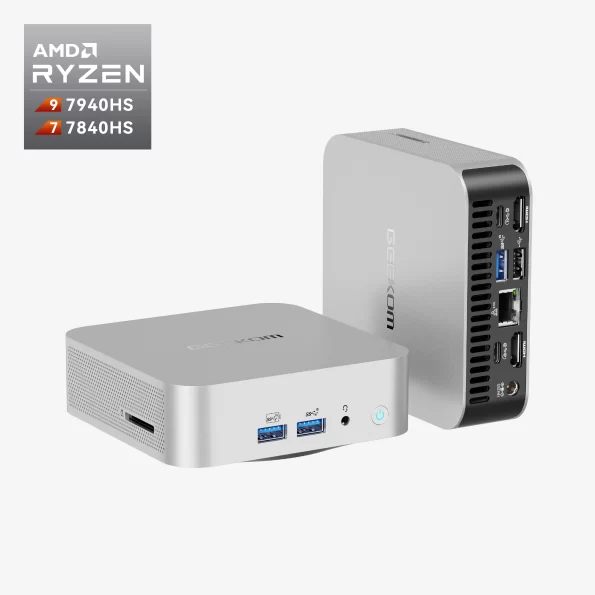
- AMD Ryzen 9 7940HS.
- AMD Radeon Graphics 780M.
- Dual-channel DDR5 5600MT/s, up to 64GB.
- M.2 2280 PCIe Gen 4 x 4 SSD, up to 2TB.
- Wi-Fi 6E and Bluetooth 5.2.
- Stunning minimalistic design. 0.47L aluminium housing.
Otherwise, the Intel Core i9-13900H outperforms applications that demand superior single-core performance or multi-core performance. According to gaming via integrated graphics, while it cannot compete with the Ryzen 9 7940HS, the i9-13900H offers higher overall performance for demanding apps and multitasking scenarios. This makes it a great option for users who want to get the best possible performance for professional tasks like video editing, 3D rendering, or heavy complex simulations. However, the price is higher, rising from £300 to £400 intervals. With the Core i9-13900H, hybrid architecture provides more power and performance, but will likely also generate more heat and consume a bit more power when indulged in heavy lifting.
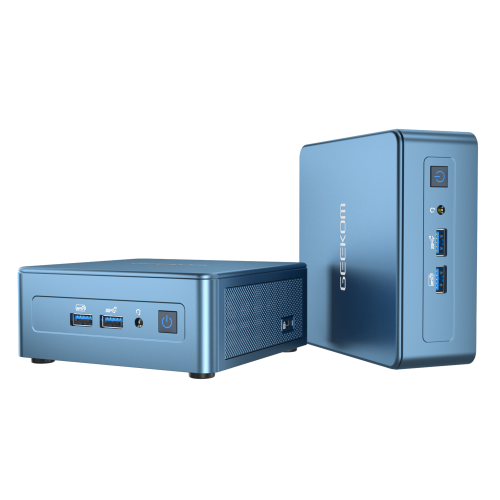
- 13th Gen Intel® Core™ i9-13900HK
- Intel® Iris® Xe Graphics for i9-13900H
- Comprehensive port selection, including two USB 4 ports.
- Supports 8K and quad displays.
- Intel® Bluetooth® 5.2 and Wi-Fi 6E.
Thus, from a budget perspective, if you’re looking for good performance on integrated graphics with maximum power efficiency, then the AMD Ryzen 9 7940HS surely stands its ground as the most favoured one. It is undoubtedly a great suggestion for gaming on a laptop or a mini PC without actually plugging in a separate graphics unit. If attaining the highest possible performance for demanding applications is required, with a bit of an expense on the side, the Intel Core i9-13900H would be the best in that way. It is superiorly dedicated to single-core and multi-core performance, setting up its strong course for professional and creative workloads.







